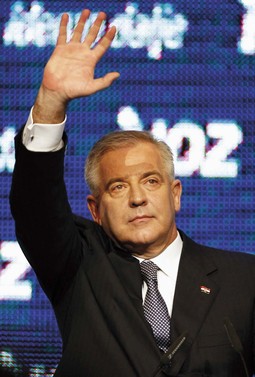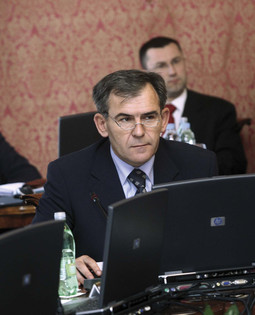Published in Nacional number 713, 2009-07-14
PRIVILEGED CASTES under fire
5 privileges Government must scrap
A BUDGET REBALANCE that will attempt to prevent the collapse of the national finances will be painful for all: which is why all privileges enjoyed by the favoured castes in Croatian society, such as government officials and construction companies, should be the first to go
 THE COSTS OF THE CHURCH Church levies have to be cut by ministers, not bishopsA complete phaseout of all privileges enjoyed by the favoured castes in Croatian society, such as many officials and politicians, has to be the first measure of the administration led by Jadranka Kosor in its plans to carry out a rebalance of the national budget, certain to cause many social consequences for most of the population. In the case of the announced cuts to wages and pensions and the scraping of free textbooks, the first that have to be stopped are the privileges of at least five social groups and projects on which massive quantities of money have been spent for years, senselessly and without any justifiable reason.
THE COSTS OF THE CHURCH Church levies have to be cut by ministers, not bishopsA complete phaseout of all privileges enjoyed by the favoured castes in Croatian society, such as many officials and politicians, has to be the first measure of the administration led by Jadranka Kosor in its plans to carry out a rebalance of the national budget, certain to cause many social consequences for most of the population. In the case of the announced cuts to wages and pensions and the scraping of free textbooks, the first that have to be stopped are the privileges of at least five social groups and projects on which massive quantities of money have been spent for years, senselessly and without any justifiable reason.
The basis of cuts in the national budget has to be the scrapping of privileged pensions and other privileges enjoyed by politicians and government officials, a significant reduction in outlays to the Catholic Church and to Croatians in Bosnia & Herzegovina, and a revision of the list of war veterans, whose number has risen to an unbelievable half a million. The fifth imperative is to stop construction of political projects without economic justification, such as the Peljesac bridge or the motorways to Bjelovar and Sisak. Jadranka Kosor is, of course, forced to implement measures that will not meet with the approval of most Croatians. There is no country in which the public demonstrates sympathy for the slashing of rights and a drop in the standard of living. The cuts planned by the HDZ-led Government will hit over a million Croatians, at least half of the pensioners, several hundred thousand public and civil servants, parents whose children go to school, and indirectly the members of their families. It is quite clear that the public outcry will be directed towards the current administration. That is exactly why Jadranka Kosor must make some brave decisions that would save the country several billion kuna and - which is much more significant - demonstrate that there are no more holy untouchables and privileged groups for the coalition government led by the HDZ.
1. POLITICIANS AND OFFICIALS
The biggest problem is in the privileged pensions, a source of political corruption in Croatia. At issue is not just the injustice, since most privileged pensions come out to 9,400 kuna, which is five times more than the average "regular" pension of 1,900 kuna, and twice the average wage. These benefits were introduced in the first half of the 1990s under the leadership of Franjo Tudjman, and its effect was two-pronged: guaranteed benefits disciplined the HDZ Members of Parliament, and the opposition was less than zealous in its objection. Sanader continued the policies of his predecessors and will, now that he has tendered his resignation, benefit personally, and will continue to receive his wage of 22,500 kuna for another half year, regardless of the fact that he will not work for it even a minute.
 IVO SANADER, the former Prime Minister, has the right to six months of full wagesMembers of Parliament have the right to retire as soon as they have served two years of their term, at 55 years of age for women and 60 for men, yet another discrimination towards other citizens. A further 180,000 or so pensioners receive privileged pensions on various grounds, which costs about 5 billion kuna every year. Another example of inefficiency is the cumbersome national and local administrations, divided into 122 cities and 520 municipalities. And while analysis has shown that a third of these should be phased out, and that 30 percent of those employed are redundant, nobody has dared make these justified cuts. Jadranka Kosor has the full moral justification to cut privileges and if she does do so will certainly win public approval.
IVO SANADER, the former Prime Minister, has the right to six months of full wagesMembers of Parliament have the right to retire as soon as they have served two years of their term, at 55 years of age for women and 60 for men, yet another discrimination towards other citizens. A further 180,000 or so pensioners receive privileged pensions on various grounds, which costs about 5 billion kuna every year. Another example of inefficiency is the cumbersome national and local administrations, divided into 122 cities and 520 municipalities. And while analysis has shown that a third of these should be phased out, and that 30 percent of those employed are redundant, nobody has dared make these justified cuts. Jadranka Kosor has the full moral justification to cut privileges and if she does do so will certainly win public approval.
2. THE CATHOLIC CHURCH
Another problem in today's Croatia is the privileged position of the Catholic Church, which is manifested in financial privileges to the largest religious community in the country. These are based on an agreement with the Vatican whereby the Government led by Zlatko Matesa undertook the long-term obligation to finance Church activities, and provided for the powerful influence of religion on education, the state-owned media such as Croatian Television, and even on the legislative branch of government. This kind of influence is not only incompatible with the fundamental doctrines of a secular state; it is also very expensive. Since the agreement was concluded with the Vatican, Croatia has paid over 3 billion kuna to the Catholic Church, and the obligation in 2009 amounts to 291 million kuna. Most of this goes to wages for priests, for which some 357,000,000 kuna are to be paid out next year. Even the Church authorities have grasped that there financial demands have become excessive and a few months ago Cardinal Josip Bozanic announced rationalisation measures. But given the links between the Church and the HDZ it is hard to expect Jadranka Kosor to undertake a significant reduction of these outlays, even though this is a unique opportunity to do so. Besides, the Prime Minister has not had much of a reputation in the Church this last year as she backed an anti-discrimination bill last summer that the Church leadership is convinced provides for homosexual marriages. Given that she is a single mother and twice divorced, Jadranka Kosor will never be the ideal woman advocated by the Catholic Church in Croatia. Church expenditures have to be rationalised by ministers, not by bishops, and this needs to be one of the imperatives in the budget rebalance.
3. PHONEY WAR VETS
 TOMISLAV IVIC, the new Minister of Family, Veteran's Affairs and Intergenerational SolidarityAnd a third problem needs to be addressed - at least on the mid-term - and that is a reduction in the number of people that enjoy veteran's benefits. There is a consensus in Croatia that a figure of 500,000 veterans is blown out of proportion and that it very directly belittles true war vets. There were half as many, and the privileges phoney veterans have gained reduces the rights of those who really fought in the war. It was recently revealed that Split Mayor Zeljko Kerum drives his 200,000-euro Ferrari using the benefits of a relative who took part in the war. The example of Kerum is just one of the many cases in which laws are bypassed and the state is short-changed for millions of kuna. It is an open question whether someone with a few months in the war should have privileges, and whether some pensions could be reduced. Of course, the rights of true war invalids and the families of those who fell in battle should not be threatened, but it is a generally known fact that the figure of dead and wounded has been manipulated. The problem, of course, is that Jadranka Kosor herself is largely responsible for this state of affairs. She was the Veteran's Affairs Minister for six years and promoted a policy that created an untouchable social caste out of phoney war vets. Except that now the national coffers are empty, and the European Union is also demanding cuts to veteran's benefits, and the move would meet with the approval of a great deal of the public. In principle the procedure is simple. It would be enough to set up a commission made up of several prominent war veterans, who would carry out a revision of the existing lists and thus resolve a pressing problem for Croatia.
TOMISLAV IVIC, the new Minister of Family, Veteran's Affairs and Intergenerational SolidarityAnd a third problem needs to be addressed - at least on the mid-term - and that is a reduction in the number of people that enjoy veteran's benefits. There is a consensus in Croatia that a figure of 500,000 veterans is blown out of proportion and that it very directly belittles true war vets. There were half as many, and the privileges phoney veterans have gained reduces the rights of those who really fought in the war. It was recently revealed that Split Mayor Zeljko Kerum drives his 200,000-euro Ferrari using the benefits of a relative who took part in the war. The example of Kerum is just one of the many cases in which laws are bypassed and the state is short-changed for millions of kuna. It is an open question whether someone with a few months in the war should have privileges, and whether some pensions could be reduced. Of course, the rights of true war invalids and the families of those who fell in battle should not be threatened, but it is a generally known fact that the figure of dead and wounded has been manipulated. The problem, of course, is that Jadranka Kosor herself is largely responsible for this state of affairs. She was the Veteran's Affairs Minister for six years and promoted a policy that created an untouchable social caste out of phoney war vets. Except that now the national coffers are empty, and the European Union is also demanding cuts to veteran's benefits, and the move would meet with the approval of a great deal of the public. In principle the procedure is simple. It would be enough to set up a commission made up of several prominent war veterans, who would carry out a revision of the existing lists and thus resolve a pressing problem for Croatia.
4. CROATIANS IN BOSNIA & HERZEGOVINA
The fourth privileged group are the Croatians of Bosnia & Herzegovina, for whom Croatian Government annually earmarks several hundred million kuna, although one should take into consideration a recent statement by Ante Colak, one of the leading HSS politicians in the neighbouring country, who said that, "Croatians in Bosnia & Herzegovina have, actually, never seen this money." Since back in the time of Tudjman and Susak Croatia has invested vast sums of money into parts of Bosnia & Herzegovina with a Croatian majority. This year alone there are plans to invest 94 million kuna on the return of refugees and reconstruction, and 24 million kuna for culture and healthcare. The Mostar Clinical Hospital was built with funds from the Croatian budget, close to 50 million euro have been invested into the University of Mostar and about two hundred religious edifices have been built or rebuilt. The massive influence of the Croatian Diaspora in Bosnia & Herzegovina is evident from their right to vote at elections in Croatia. Thanks to their five deputies the HDZ was able to form a Government and no one in the current Government is even thinking of scrapping the Diaspora election slate. It is an open question how much longer this situation can go on, in which funds are invested into a university in another country (with questionable staff and results) that would cover the issuing of free textbooks in Croatia. In this way Croatian Government provides for the citizens of another country at the expense of its own citizens.
5. THE PELJESAC BRIDGE AND SIMILAR INVESTMENTS
 THE UNIVERSITY OF MOSTAR cost Croatian taxpayers 50 million euro, and other institutions have been built at their expenseThe fifth area in which there have to be budgetary cuts are irrational mega-investments like the Peljesac Bridge. Government plans to spend at least 319 million kuna to build it, in the first phase, and no one knows how much it will cost in the end. A stop on the construction of the Peljesac bridge is, in fact, one of the easiest decision Jadranka Kosor has to make because practically everyone is opposed to this investment. Sanader was the only one to continually support the Peljesac bridge. That is why she would make a huge step in saving the national budget by stopping the project, and also in emancipating herself from the negative legacy of her long time political mentor, Ivo Sanader.
THE UNIVERSITY OF MOSTAR cost Croatian taxpayers 50 million euro, and other institutions have been built at their expenseThe fifth area in which there have to be budgetary cuts are irrational mega-investments like the Peljesac Bridge. Government plans to spend at least 319 million kuna to build it, in the first phase, and no one knows how much it will cost in the end. A stop on the construction of the Peljesac bridge is, in fact, one of the easiest decision Jadranka Kosor has to make because practically everyone is opposed to this investment. Sanader was the only one to continually support the Peljesac bridge. That is why she would make a huge step in saving the national budget by stopping the project, and also in emancipating herself from the negative legacy of her long time political mentor, Ivo Sanader.
Related articles
Barisic could bankrupt HDZ
Chief State Attorney Mladen Bajic could strike a massive blow against the ruling HDZ party with a single signature, and put the party into… Više
Latest news
-
28.10.2010. / 14:15
'A profitable INA is in everyone's interest'
-
28.10.2010. / 09:38
Sanader’s eight fear SDP — Won’t bring down Government
-
21.10.2010. / 15:02
Interior Ministry turned a blind eye on Pukanic assassination
-
20.10.2010. / 09:34
Barisic could bankrupt HDZ




